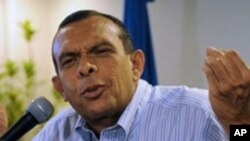Honduras will hold general elections on Sunday, which many hope will allow the Central American nation to move past a six-month political crisis. Neither ousted president Manuel Zelaya or the de facto leader Roberto Micheletti are running for office. But the dispute between the two men remains a key issue in the campaign.
Polls are set to open Sunday in Honduras to select a new leader, six months after President Manuel Zelaya was removed from office and flown out of the country.
The crisis over the presidency has cast a shadow over the campaigns of the leading presidential candidates, even as they seek to promote their own agendas and look to the future. In fact, the top candidates gathered Thursday to sign a pledge to respect the outcome of the vote and honor a constitutional ban on re-election. Mr. Zelaya was ousted from office when he pushed for a referendum on whether to reconsider the ban on re-election.
Experts say the frontrunner in the presidential campaign is Porfirio Lobo, a wealthy rancher whose campaign has centered on tough security measures and an open economy. Like other candidates, Lobo has tried to avoid commenting on the ouster of Mr. Zelaya. But he says, if elected, one of his main priorities will be to restore foreign ties which have suffered in recent months. Lobo says he is interested in strong relations with all nations, especially regional powerhouse Brazil. He says he has been trying to approach Brazil's president in the hopes of repairing ties after the election.
His main challenger is Elvin Santos, who served as vice president to Mr. Zelaya until he resigned to run for the presidency. During the campaign, Santos has sought to distance himself from the ousted leader, especially on the need to reform the constitution to allow re-election.
Santos says his campaign has no choice but to demand that decisions are in line with the law and not with someone's personal interests.
Regardless of the outcome on Sunday, a major concern for all candidates is whether Latin American and other foreign governments will recognize the vote. Brazil and Argentina have been calling for Mr. Zelaya to be returned to office, and said they will not accept the vote otherwise. Meanwhile, Canada, Panama, Colombia and Peru have said they will recognize the election.
In Washington, U.S. State Department spokesman Ian Kelly said the election is a crucial step in restoring international confidence in Honduras, but it is not the only one. He said the government still wants to see Honduras implement a power-sharing deal that was signed in October.
The deal called for Honduran lawmakers to vote on whether to allow Mr. Zelaya to return to office, but congress has yet to call a vote.
Still, the election gained a strong boost this week from Costa Rica's President Oscar Arias, who helped launch negotiations that led to the power-sharing deal. He said his government was prepared to accept the vote results. Mr. Arias said the coup has done the most damage to the Honduran people, who have suffered from hurricanes in recent years. He says there is no reason Honduras should become a pariah because foreign nations refuse to recognize the new government.
Another issue that may taint the vote result is low turnout. Supporters of Mr. Zelaya are calling for an election boycott because they say the vote cannot be free and fair if it is organized by the de facto government. Critics of the current administration also accuse security forces of arresting and beating opponents and other violations. In turn, officials blame supporters of the ousted leader for launching bomb attacks and disrupting campaign activities.
Several international human rights groups have expressed concern about conditions under the de facto government. Marcia Aguiluz has been documenting complaints against the government on behalf of the Center for Justice and International Law, based in Costa Rica. Aguiluz says some people are fearful of what may happen over the weekend, and some are leaving the country or traveling to border areas to avoid possible violence by security forces.
Honduran officials have launched a series of measures in recent weeks, such as seizing illegal guns and activating military reservists. They say the efforts are aimed at ensuring peace and stability during the vote.
News
Honduras Election Aims to Move Past Crisis

But dispute remains key issue in campaign



